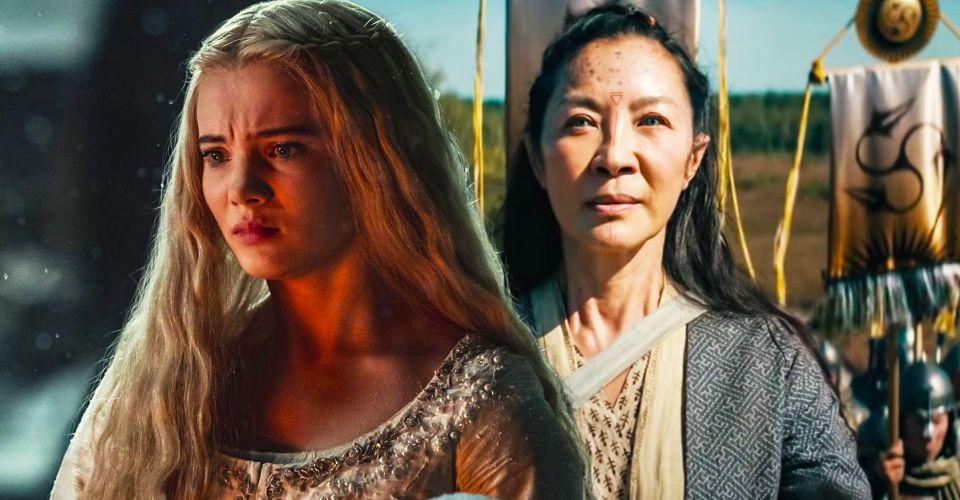The Witcher Prequel Series Isn’t What You Think – Theory Explained

It’s fair to draw the theory that Netflix’s upcoming The Witcher prequel series, The Witcher: Blood Origin, isn’t what you think and will greatly differ from audience expectations. Starring Henry Cavill, Freya Allan, and Anya Chalotra, The Witcher has been a hit for Netflix. It’s released at a time when fantasy shows are all the rage, with the popularity of Game of Thrones proving there’s a demand for long-form fantasy storytelling on the small screen.
The Witcher is based on the series of popular novels by Polish author Andrzej Sapkowski and Netflix is wasting no time expanding it into a wider franchise. That effort began with the prequel animated movie The Witcher: Nightmare of the Wolf, which told the story of Geralt’s mentor, Vesemir, ahead of his live-action debut in The Witcher season 2. It will continue with another prequel, this time a live-action miniseries titled The Witcher: Blood Origin. This is expected to reveal the origins of the first Witchers, presumably setting up major aspects of The Witcher season 3.
The second season of The Witcher ended with a post-credits trailer for The Witcher: Blood Origin, giving viewers their first real glimpse of the prequel. However, combined with the lore revealed in The Witcher season 2, it strongly suggests this prequel series isn’t actually about the origins of the Witchers at all. While that will be covered, it’s likely to be incidental; rather, the focus seems to be on the elves, and it is presumably the origin story of the Elder Blood.
The Witcher: Blood Origin Is All About The Elves

In a recent interview, The Witcher: Blood Origin showrunner Declan De Barra explained his focus was very much on the Continent before the Conjunction that brought human beings and monsters to the world. “I just was fascinated with the idea of what a pre-colonized world would look like for the elves,” he observed, and pointed to the writings of Sapkowski to explain his inspiration. “He reinterprets folktales and history,” he pointed out. “And when you look at our own history, societies that had been at their height, like the Roman Empire or the Mayan Empire, that’d be right before the fall and then we’re in dark ages again. That fascinated me to wonder what that world could have been: what society would have been like and what elves wanted. That’s what we’re going to explore here.” (via EW) The human characters of The Witcher have always believed the Continent was savage and uncivilized before the Conjunction and the arrival of their race, but instead, De Barra seems to view it as an elven golden age that was lost.
The Witcher: Blood Origin‘s trailer reinforced that sense. It focused on the world before the Conjunction of the Spheres, and three elven characters who will play a major role in the story: Éile, an elite warrior played by Sophia Brown; Fjall, a member of a rival clan played by Laurence O’Fuarain; and Sciane, last of a nomadic tribe of sword-elves, played by Michelle Yeoh. It’s notable that it only offers hints of the Conjunction of the Spheres, with one shot showing mysterious green flares in the heavens presumably associated with them, and the three leads in a battle against the first human invaders. Given the Conjunction of the Spheres introduced both humanity and monsters to the Continent, the story of The Witcher: Blood Origin looks set to explore the societal impact of their arrival.
The First Witchers Didn’t Arrive 1,200 Years Ago

This is where a little knowledge of The Witcher‘s lore comes in handy as a lot was explained in season 2 ahead of The Witcher‘s prequel series. According to season 2, mages initially attempted to control and weaponize the monsters, and it was only when this went wrong that the first Witchers were created. In fact, according to one line of dialogue from Vesemir, the Witchers as viewers know them were only created 300 years before the events of the current series – some 900 years after the Conjunction of the Spheres, which will be shown in The Witcher: Blood Origin. It’s important to note the timeline isn’t just a mistake; The Witcher‘s showrunner Lauren Hissrich served as executive producer on the prequel and has openly discussed rewriting scripts to make sure everything fits together.
Marketing for The Witcher: Blood Origin has consistently hinted at proto-Witchers, but the timeline means viewers should be careful not to expect anything more than hints of the Order of the Wolf. In fact, in Sapkowski’s own notes there have been consistent suggestions that the earliest attempts to create Witchers went badly wrong, meaning the proto-Witchers who appear in The Witcher‘s prequel may be fundamentally flawed. In any case, though, they’ll only be one aspect of the story, introduced after the Conjunction of the Spheres has happened, and thus likely a secondary plot rather than a primary one.
What’s The “Blood Origin” Of The Witcher Prequel?

Rather than focus on the origin of the Witchers themselves, it is more likely that The Witcher‘s prequel series will be centered upon the origin story of the Elder Blood and thus a literal “Blood Origin.” In The Witcher‘s wider lore, ancient elven sages engineered a mutated gene in the hopes they could create a Child of Elder Blood who could open the gateway between the spheres. The last elf to inherit the Elder Blood was Lara Dorren – glimpsed by Ciri in a vision in The Witcher season 2 – but she appalled the elves by mating with a human, introducing the Elder Blood into humans. Ciri is the foretold Child of Elder Blood from elven legend.
The Witcher season 2 subtly hinted elven mages were actually responsible for the Conjunction of the Spheres in the first place; while approaching the hut containing the Mother in Darkness, Yennefer walked through cave-paintings recounting the history of the Conjunction, and immediately before it, there was a painting of an elven sorceress with her hands placed upon the Monoliths that caused the Conjunction. It’s reasonable to assume, then, that elven sorcerers who possessed the Elder Blood triggered the first Conjunction, and that The Witcher: Blood Origin may even go on to reveal the full story of Lara Dorren. That would make it perfectly timed, and it would certainly explain why Lauren Hissrich mentioned scripts for The Witcher season 3 needed to be rewritten to accommodate revelations in the prequel series.
A focus on the Elder Blood would even fit with the introduction of proto-Witchers, as well. The Witcher season 2 revealed Elder Blood is a core component in the mutagens that create Witchers during the Trial of the Grasses, and that Ciri has Elder Blood. Thus, any real hints of the first Witchers will surely require the Elder Blood. It all ties together rather well, supported by The Witcher prequel series’ title of The Witcher: Blood Origin.
About The Author


















